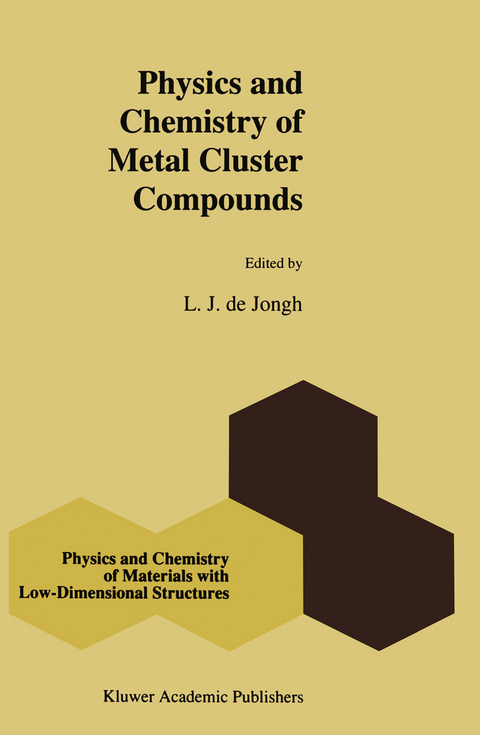
Physics and Chemistry of Metal Cluster Compounds
Springer (Verlag)
978-90-481-4369-6 (ISBN)
1. Introduction to Metal Cluster Compounds: From Molecule to Metal!.- 1.1. The impact of cluster-science.- 1.2. Structural characteristics of metal clusters.- 1.3. Electronic energy-level structures.- 1.4. Brief introduction to the physical properties of metal cluster compounds.- 1.5. Conductivity studies.- 1.6. Application of the Anderson-Hubbard approach.- References.- 2. High-Nuclearity Carbonyl Metal Clusters.- 2.1. Introduction.- 2.2. Synthesis and reactivity.- 2.3. Structural aspects.- 2.4. Electron counting for clusters.- References.- 3. Ligand-Stabilized Giant Metal Clusters and Colloids.- 3.1. Strategy for making giant metal clusters.- 3.2. Synthetic and structural examples.- 3.3. Chemical properties.- 3.4. Catalysis.- 3.5. Outlook.- References.- 4. Theory of Electronic Properties of Metal Clusters and Particles.- 4.1. Why are metal particles interesting?.- 4.2. Model Hamiltonians.- 4.3. Traditional quantum chemical methods.- 4.4. Density functional approaches.- 4.5. Summary.- References.- 5. X-Ray Photoelectron Spectroscopy Applied to Pure and Supported Molecular Clusters.- 5.1. Introduction.- 5.2. Generalities of photoemission spectroscopy applied to pure and supported molecular metal clusters.- 5.3. XPS of molecular clusters.- 5.4. XPS of supported molecular clusters.- 5.5. Outlook for the future.- References.- 6. Application of Mössbauer Effect Spectroscopy to Cluster Research.- 6.1. Introduction.- 6.2. Mössbauer Effect Spectroscopy (MES).- 6.3. Our Mössbauer results.- 6.4. 197Au MES on platinum clusters.- 6.5. Conclusions.- References.- 7. Specific Heat Studies on Metal Cluster Compounds.- 7.1. Introduction.- 7.2. The lattice specific heat.- 7.3. The electronic specific heat.- 7.4. Data and discussion.- 7.5. Summary.- References.- 8. NMR in SubmicronParticles.- 8.1. Introduction.- 8.2. Surface and quantum size effects.- 8.3. ESR and NMR — Theory.- 8.4. Naked clusters — Experiment and discussion.- 8.5. Aggregates of metal cluster compounds — Experiment and discussion.- 8.6. Summary.- References.- 9. Magnetic Properties and UV-Visible Spectroscopic Studies of Metal Cluster Compounds.- 9.1. Introduction.- 9.2. Magnetic properties.- 9.3. Electronic (UV-visible-NMR) spectra.- 9.4. Conclusion.- Acknowledgements.- References.- 10. Magnetic Properties of Metal Cluster Compounds.- 10.1. Introduction.- 10.2. Magnetic properties of atoms, metals and clusters.- 10.3. Experiments on metal cluster compounds.- References.- Index of Chemical Compounds.- Index of Subjects.
| Reihe/Serie | Physics and Chemistry of Materials with Low-Dimensional Structures ; 18 |
|---|---|
| Zusatzinfo | XII, 320 p. |
| Verlagsort | Dordrecht |
| Sprache | englisch |
| Maße | 160 x 240 mm |
| Themenwelt | Mathematik / Informatik ► Informatik ► Theorie / Studium |
| Naturwissenschaften ► Chemie ► Anorganische Chemie | |
| Naturwissenschaften ► Chemie ► Organische Chemie | |
| Naturwissenschaften ► Physik / Astronomie ► Festkörperphysik | |
| Naturwissenschaften ► Physik / Astronomie ► Thermodynamik | |
| ISBN-10 | 90-481-4369-1 / 9048143691 |
| ISBN-13 | 978-90-481-4369-6 / 9789048143696 |
| Zustand | Neuware |
| Informationen gemäß Produktsicherheitsverordnung (GPSR) | |
| Haben Sie eine Frage zum Produkt? |
aus dem Bereich


